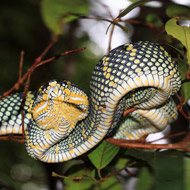
Discovery could lead to safer treatment for blood clots
A protein found in snake venom could lead to a safer treatment for blood clots, new research has found.
According to Medical News Today, a protein derived from the venom of the tropidolaemus wagleri snake has reduced the formation of blood clots in mice, without excessive bleeding.
The research was carried out by National Taiwan University in Taipei and published in the journal Arteriosclerosis, Thrombosis, and Vascular Biology.
Current methods for reducing the formation of blood clots - such as aspirin and clopidogrel - work by preventing platelets from clumping together. Doctors prescribe these antiplatelet medications to prevent heart attack, stroke and heart disease, but a major side effect is bleeding after an injury.
It is hoped that this new discovery could pave the way to a new antiplatelet drug that is equally effective, but not cause excessive bleeding.
Trowaglerix
In previous studies, researchers found that that trowaglerx - a protein found in the venom of tropidolaemus wagleri - interacts with glycoprotein VI (GPVI) - a protein that resides on the surface of platelets - to form blood clots.
In this new study, Dr Jane Tseng and her colleagues assessed the structure of this protein and were able to create a drug that blocks GPVI activity.
When they tested the drug on mice, the mice experienced slower blood clot formation. They also didn’t bleed any longer than mice that hadn’t been treated with the drug.
Dr Tseng believes the findings suggest that trowaglerix might offer a safer, effective strategy to prevent blood clots. But she stresses that more research is needed to ascertain the safety and efficacy of the drug in humans.
"In general, this type of molecule design does not last long in the body, so techniques like formulation or delivery system are likely needed to extend the exposure time in the human body," she told Medical News Today.
“The design must also be optimised to ensure that the molecule only interacts with GPVI and not other proteins which can cause unintended reactions."



 The veterinary mental health charity Vetlife is inviting the veterinary community to join it for a sponsored cold-water dip.
The veterinary mental health charity Vetlife is inviting the veterinary community to join it for a sponsored cold-water dip.